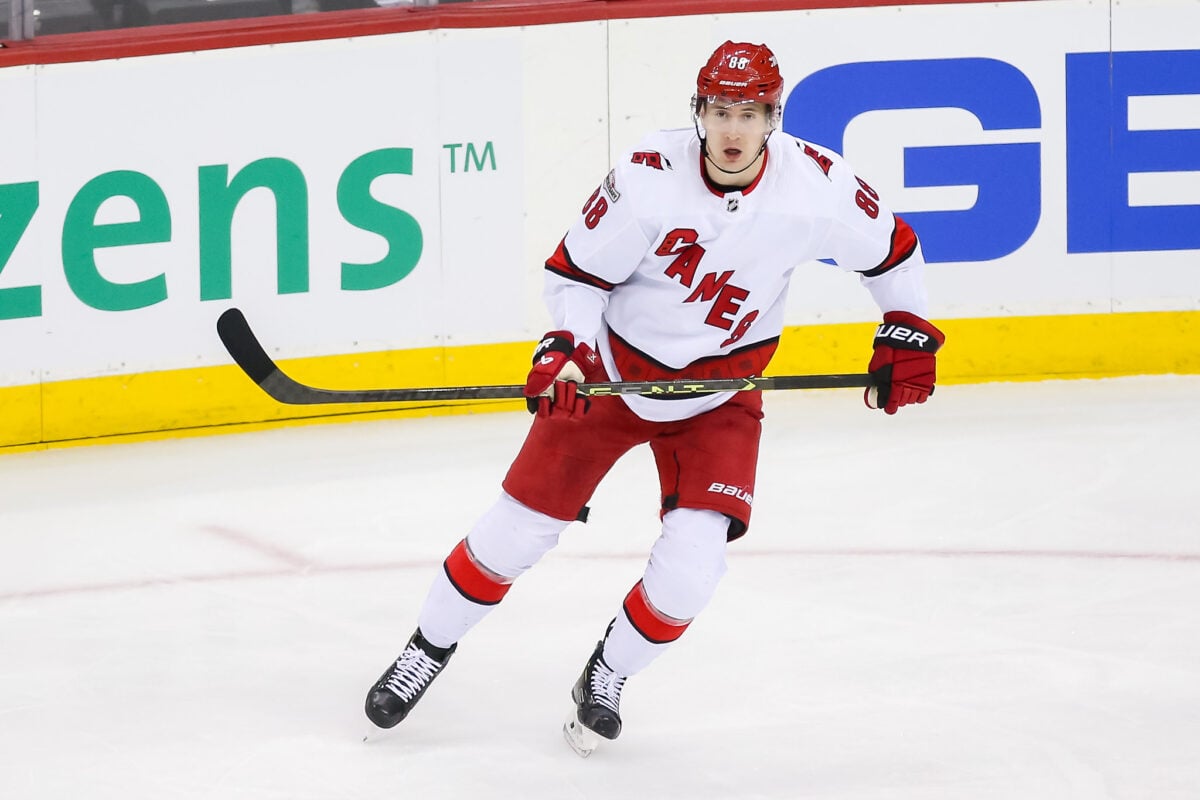The New Jersey Devils’ matchup against the Carolina Hurricanes on Saturday evening was quite drama-filled…so much so that Roy Cooper, the Governor of North Carolina, decided to take to Twitter/X to comment:
“Glad our Carolina Hurricanes are done with the New Jersey Devils for the regular season. Great win tonight while surviving some vicious hits. Devils are too good for such dirty play,” posted the 67-year-old Cooper, who has been the state’s governor since 2017.
What Ensued in Hurricanes vs. Devils
For a bit of context, there were multiple incidents that caused the governor to feel this way. First, Timo Meier was given a five-minute major and a game misconduct for kneeing Martin Necas, seen here:
Timo Meier was assessed a major penalty and a game misconduct for kneeing Martin Necas pic.twitter.com/HlZQQPRA6n
— B/R Open Ice (@BR_OpenIce) December 29, 2024
Initially, there was no call. It appeared to be a pretty serious injury, as a heaved-over Necas headed straight down the tunnel with a trainer alongside him, prompting the review and the major call. But once the penalty for Meier was announced, Necas headed back out and was on the ice for the majority of the ensuing penalty.
Devils head coach Sheldon Keefe didn’t seem to be a fan of this, insinuating that Necas may have exaggerated the hit. After the game, he told the media, “They reviewed it because of the guy laying on the ice after the fact. And the guy lying on the ice plays three and a half minutes of a five-minute major. (It’s) a tough message for the players that if you take a big hit, lying down on the ice has its benefits.”
Similarly, Devils forward Paul Cotter added, “I think there was an injury that might have been blown out of proportion there by the player, and our team didn’t like it.”
Related: Devils’ Seamus Casey Speaks on World Juniors Experience
There’s certainly an argument that the hit deserved a minor penalty. Meier’s knee made contact around the same time as his upper body; it was an awkward position for both players to be in as Necas attempted to side-step the hit, moving his upper body first and leaving his knee vulnerable. However, it’s tough to say that Meier’s knee directed course any more so than the rest of his body in attempting to make contact.
Based on the fact that there was no initial call, plus that Necas immediately returned and looked completely fine, it’s understandable to see the Devils’ gripe. With that being said, it’s also reasonable for the Hurricanes to be on edge about it, especially when their star forward (44 points in 35 games) could have been seriously hurt.

NHL Rule 50.1 states “Kneeing is the act of a player leading with his knee and in some cases extending his leg outwards to make contact with the opponent.”
Devils’ play-by-play announcer Bill Spaulding said, “Timo led with his shoulder, not his knee, never extended his leg outward and never even changed his route to the hit.”
While this may be true, NHL Rule 50.3 states “The referee, at his discretion, may assess a major penalty, based on the severity of the infraction, to a player guilty of kneeing an opponent.”
Whether it was caused by a potential embellishment by Necas or not, the officiating crew was fully within their rights to offer that penalty to Meier. And while correlation does not always imply causation, it is worth noting that the Hurricanes are 12-1-0 with this officiating crew over the past two seasons.
Later on, former Hurricane Erik Haula seemed to get an elbow up high on Dmitry Orlov. While Haula did not raise his elbow to make the hit as Orlov was crouched down and slightly turned into it, the main point of contact was the head. Hurricanes team reporter Walt Ruff said that Orlov believes he suffered a broken nose as a result of the collision.
Dmitry Orlov believes that he suffered a broken nose as a result of the below Erik Haula hit during tonight's third period.
— Walt Ruff (@WaltRuff) December 29, 2024
"I think it's a dirty hit. I wasn't happy about it…" pic.twitter.com/LUxoiPNOQx
“I think it’s a dirty hit. I wasn’t happy about it,” Orlov said. (via Walt Ruff)
However, that one wasn’t penalized at all. Orlov later defended himself by essentially jumping Haula while he skated back to the bench. Both of them got matching minor penalties for roughing.
It’s important to understand that every “questionable” hit looks worse when analyzed in slow motion. It’s also key to understand that most fanbases are understandably on edge when their star player could potentially lose time due to an avoidable circumstance.
Was Governor Cooper justified in calling out the Devils? Or were these just hits that became overanalyzed due to exaggeration or already-established tension in the game? Let us know in the comments.
